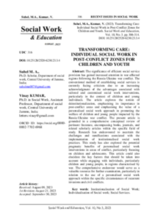The significance of efficient social service provision has gained increased attention in war-affected regions following the Russia-Ukraine war conflict. The conventional method of establishing social services is currently facing criticism due to an increasing acknowledgment of the advantages associated with tailored and customised social work interventions, particularly in the context of children and young individuals.
The article explores the notion of deinstitutionalization, emphasising its importance in post-conflict areas and emphasising the value of a personalised social work approach in promoting the welfare of children and young people impacted by the Russia-Ukraine war conflict. The present article is grounded in a comprehensive conceptual review of pertinent literature, encompassing books, journals, and related scholarly articles within the specific field of study. Research has endeavoured to ascertain the challenges and ramifications associated with the implementation of institutionalised social work practices. This study has also explored the potential pragmatic benefits of personalised social work interventions in areas of conflict, particularly focusing on children and adolescents.
This article could also elucidate the key factors that should be taken into account while engaging with individuals, particularly children and young people, in regions characterised by war. The comprehensive endeavour would serve as a valuable resource for further examination, particularly in relation to the use of a personalised social work approach within the specific circumstances of recurrent invasions and civil conflicts.

